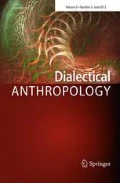Abstract
Using an approach derived from the anthropology and sociology of knowledge, this article explores the historical emergence of European social theory and its contemporary place in the human sciences. I direct ethnographic attention to a sense of crisis or impasse in social theory’s capacity to frame and to analyze the complexity of contemporary relations in the world. By reanalyzing this crisis talk as a phenomenological reaction to the growing (sub)specialization of social theory, I offer a new way of thinking about social theory in terms of specialized analytical attentions. I also suggest how we can move from crisis talk to a new ethics of theoretical complementarity, inspired by Dilthey, which I term “multiattentional method.”
Similar content being viewed by others
References
Abbott, A. 1988. The system of professions: An essay on the division of expert labor. Chicago: University of Chicago Press.
Bourdieu, P. 1988. Homo academicus. Stanford: Stanford University Press.
Bourdieu, P. 1991. Language and symbolic power. Cambridge: Harvard University Press.
Bourdieu, P. 2000. Pascalian meditations. Stanford: Stanford University Press.
Boyer, D. 2003. The medium of foucault in anthropology. The minnesota review 58–60:265–272.
Boyer, D. 2005. Spirit and system. Chicago: University of Chicago Press.
Dilthey, W. 1988. Introduction to the human sciences. Detroit: Wayne State University Press.
Foucault, M. 1971. The order of things. New York: Vintage.
Foucault, M. 1979. Discipline and punish. New York: Pantheon.
Foucault, M. 2000. In Power, ed. J. Faubion. New York: Free Press.
Freud, S. 1900. Die Traumdeutung. In Gesammelte Schriften, ed. A. Freud, and A.J. Storfer, 2–3. Vienna: Internationaler Psychoanalytischer Verlag.
Freud, S. 1919. Das Unheimliche. In Gesammelte Schriften, ed. A. Freud, and A.J. Storfer, 10. Vienna: Internationaler Psychoanalytischer Verlag.
Gramsci, A. 1971. Selections from the prison notebooks. New York: International.
Holmes, D.R., and G.E. Marcus. 2005. Cultures of expertise and the management of globalization: Toward the re-functioning of ethnography. In Global assemblages, ed. A. Ong, and S.J. Collier. Oxford: Blackwell.
James, W. 1907. Pragmatism. New York: Longman Green.
Jarausch, K.H. 1982. Students, Society and politics in imperial Germany: The rise of academic illiberalism. Princeton: Princeton University Press.
Latour, B. 1987. Science in action. Cambridge: Harvard University Press.
Latour, B. 1993. We have never been modern. Cambridge: Harvard University Press.
Mannheim, K. 1936. Ideology and Utopia: An introduction to the sociology of knowledge. New York: Harcourt.
Mannheim, K. 1993. The problem of a sociology of knowledge. In From Karl Mannheim, ed. K.H. Wolff. New Brunswick: Transaction.
Marx, K. 1971/1844. Die entfremdete Arbeit. In Frühe Schriften, Band I. Darmstadt: Wissenschaftliche Buchgesellschaft.
Marx, K. 1971/1846 Die deutsche Ideologie. In Frühe Schriften, Band II. Darmstadt: Wissenschaftliche Buchgesellschaft.
Merleau-Ponty, M. 1962. Phenomenology of perception. London: Routledge.
Miyazaki, H., and A. Riles. 2005. Failure as an endpoint. In Global assemblages, ed. A. Ong, and S.J. Collier. Oxford: Blackwell.
Montesquieu, C.S. 1989/1748. The spirit of the laws. Cambridge: Cambridge University Press.
Nietzsche, F. 1994/1886. Jenseits von Gut und Böse. In Werke, ed. R. Toman. Köln: Könemann.
Obeyesekere, G. 1990. The work of culture. Chicago: University of Chicago Press.
Postone, M. 1980. Antisemitism and national socialism: Notes on the German reaction to the holocaust. New German Critique 19: 117–136.
Rabinow, P. 1999. French DNA: Trouble in purgatory. Chicago: University of Chicago Press.
Ringer, F.K. 1969. The decline of the German Mandarins: The German academic community, 1890–1933. Cambridge: Harvard University Press.
Rousseau, J.-J. 1987/1754. Discourse on the origin of inequality. In The basic political writings, ed. D.A. Cress. Indianapolis: Hackett.
Said, Edward. 1983. The world, the text and the critic. Cambridge: Harvard University Press.
Weber, M. 1992/1919. Poltik als Beruf. Stuttgart: Reclam.
Wolff, L. 1994. Inventing Eastern Europe. Stanford: Stanford University Press.
Zizek, S. 2006. The parallax view. Cambridge: MIT Press.
Acknowledgements
I would like to thank George Marcus whose Center for Ethnography at UC-Irvine sponsored the lectures from which this article is drawn. For brilliant commentary on, and criticism of, those lectures James Faubion and Kaushik Sunder Rajan earned my deep thanks and praise. I would like to thank a group of students past and present who took the time to read an earlier draft of this text and to weigh in with insights of their own: Jaideep Chatterjee, Jess Falcone, Daena Funahashi, Drew Johnson, Towns Middleton, Jen Shannon, Eli Thorkelson and Marcus Dubois Watson. And, not least, I am grateful to Kirk Dombrowski and George Baca for their much-needed encouragement and openness to publishing this essay at Dialectical Anthropology.
Author information
Authors and Affiliations
Corresponding author
Rights and permissions
About this article
Cite this article
Boyer, D. On the ethics and practice of contemporary social theory: from crisis talk to multiattentional method. Dialect Anthropol 34, 305–324 (2010). https://doi.org/10.1007/s10624-009-9141-6
Published:
Issue Date:
DOI: https://doi.org/10.1007/s10624-009-9141-6




